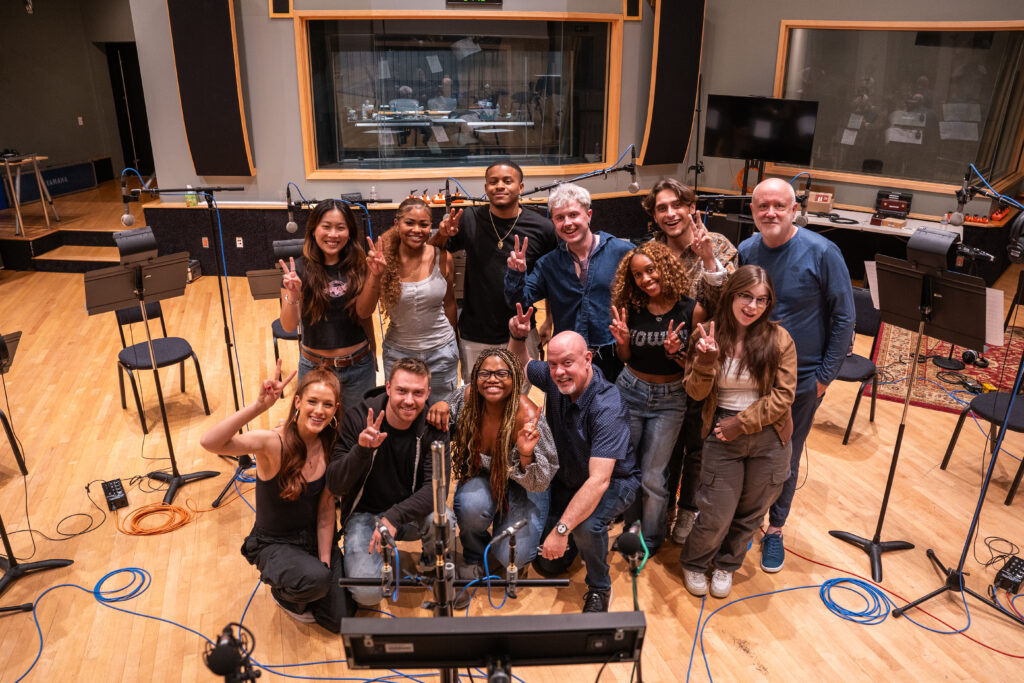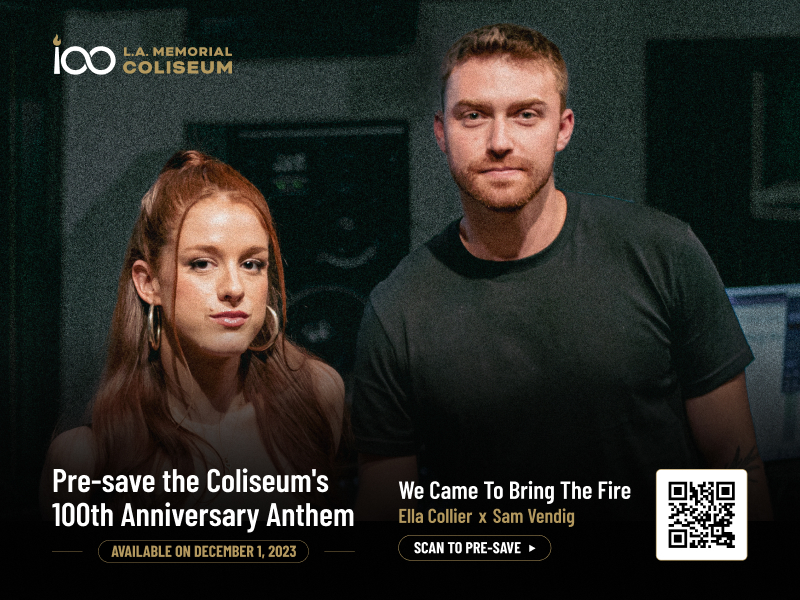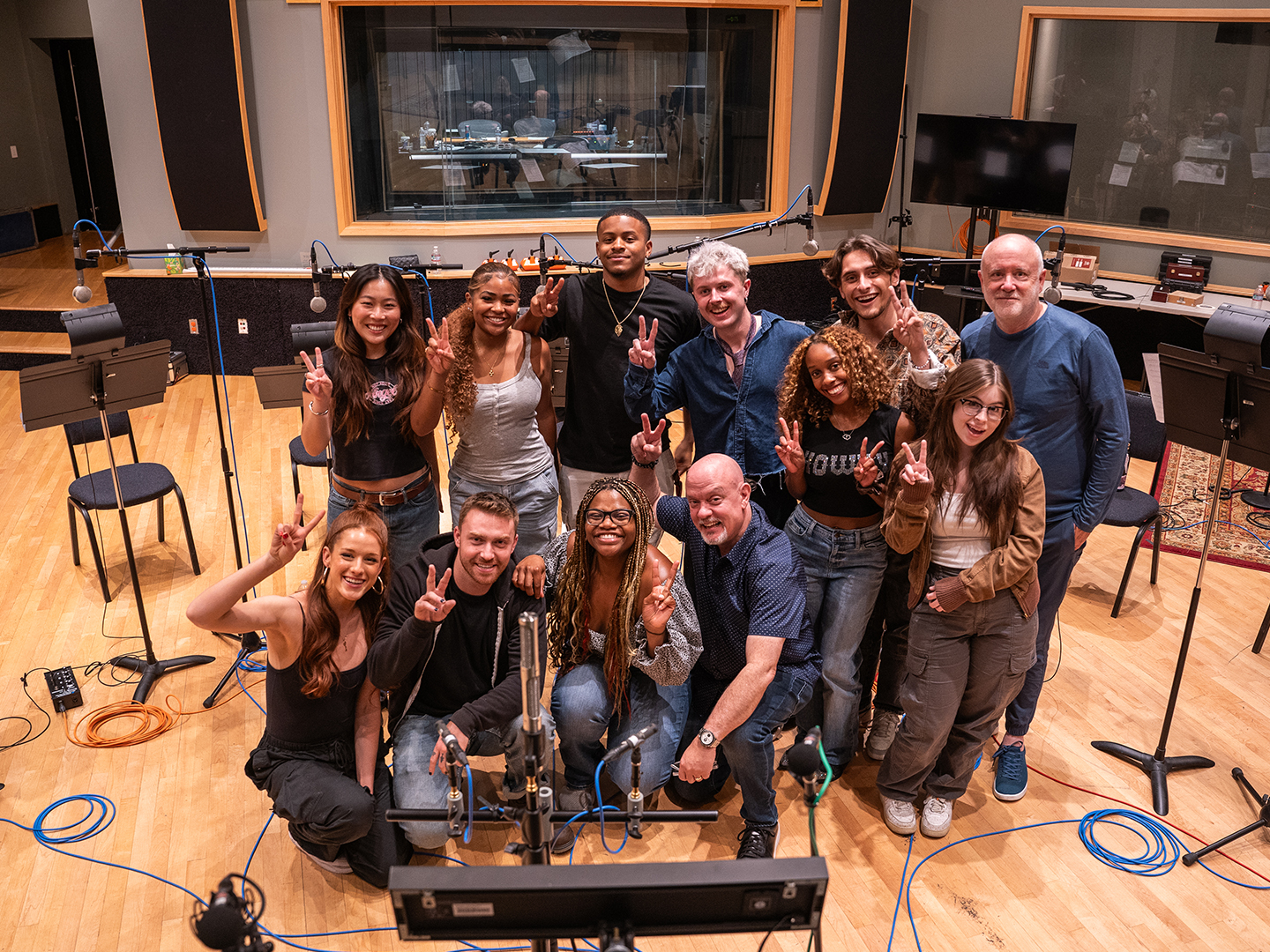
A Song for the Ages
By Julie Riggott
USC Thornton alumni ‘bring the fire’ with a propulsive anthem celebrating the Coliseum’s 100-year anniversary.
Over the past 100 years, the iconic Los Angeles Memorial Coliseum has hosted giants of sports and music — including the 1932 and 1984 Olympics; the Dodgers, Rams, and Raiders; the World Series and Super Bowl; the Rolling Stones, Bruce Springsteen and U2 — as well as historic political and social justice leaders — such as Franklin Roosevelt, John F. Kennedy, Martin Luther King Jr. and Nelson Mandela. Of course, it has also been the home of USC Trojan football since the USC-Pomona-Pitzer game in October 1923.
But on a quiet day this past September, the 77,500-seat stadium stood empty. Only a small group of L.A. Coliseum staff had gathered to listen to seven songs, all commissioned from USC Thornton School of Music alumni as a unique way to commemorate the centennial of the storied venue.
“We asked Thornton alumni to come back to their alma mater and to draw on the skills they honed here as music students to write and compose original songs in celebration of the Coliseum’s 100th anniversary,” said Jason King, Dean of USC Thornton. “What’s exciting is that the project has grown to include not only alumni but also current students and faculty from Thornton in addition to our friends and partners across the university. The fact that the project has brought so many people together who are in some way connected to Thornton’s past and present seems like a fitting way to celebrate the centennial.”
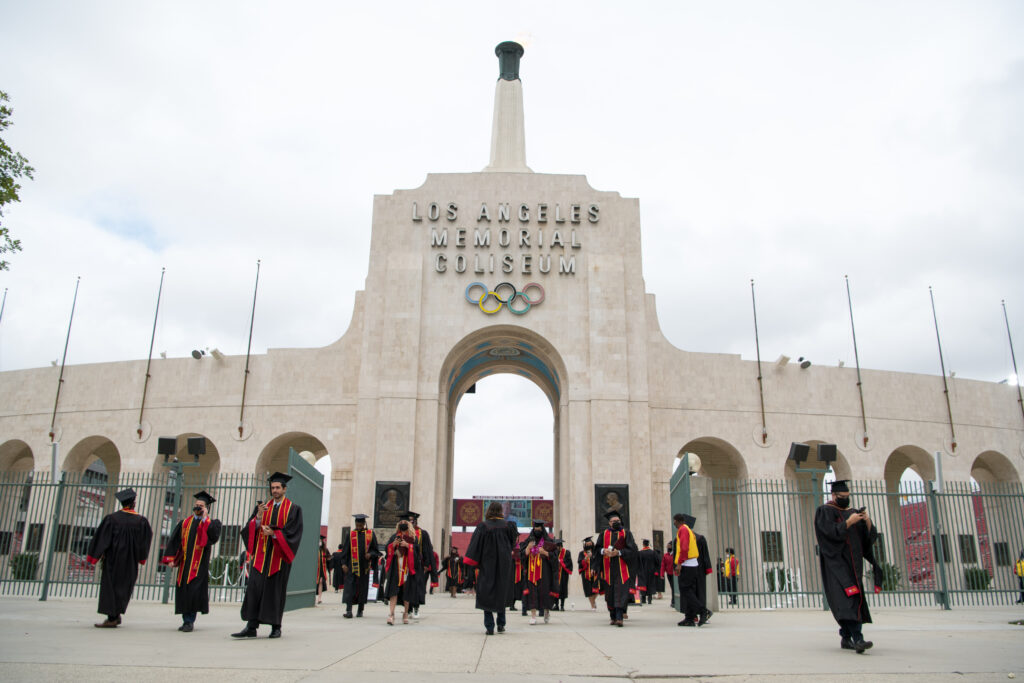
Over the sound system at the Coliseum, the stadium-rattling anthems played as staff tried to make their final decision about which one brought all the feels, from inspired to celebratory to proud. It was easy to imagine every one of them bringing crowds to their feet. But in the end, they could only choose one. The victor was “We Came to Bring the Fire,” a rousing pop song by Ella Collier ’22 and Sam Vendig ’17. The song begins with a moody synthesized beat that opens into rhythmic lyrics, a propulsive groove and a killer hook:
We came to bring the fire
Hold it higher
We came to bring the fire
For the fighters
Victory
Through the blood and the tears
It begins
And ends right
Here
“All the song entries were inspiring, which made selecting a winner immensely challenging,” said Joe Furin, general manager of the Los Angeles Memorial Coliseum. “‘We Came to Bring the Fire’ stood out because it truly embodies the resiliency and enduring spirit that defines both the Coliseum and USC, and perfectly pays homage to our extensive history while looking ahead with fresh energy. We are really proud of this final product and cannot wait to share it with the world.”
The song’s debut comes Saturday, Oct. 21, 2023, at the USC-Utah football game, when Collier and Vendig will perform live during half-time with a custom arrangement by the USC Trojan Marching Band. The songwriters and musicians went into the studio earlier this month, with distribution via Spotify and other platforms anticipated for Dec. 1.
Keeping It In-House
Commissioned as a memorial to Los Angeles veterans of World War I, the Coliseum was named a National Historic Landmark in 1984. It is managed and operated by the Auxiliary Services Department of the University of Southern California.
Despite the ties between USC and the Coliseum, Sean Holt, vice dean of the Division of Contemporary Music at USC Thornton, didn’t consider it a fait accompli that the music school should have gotten the call regarding the anniversary song.

“They could have gone to anybody,” Holt said. “They could have gone to the top artists on the playlists right now because it’s a world-renowned staple in the conversation that is Los Angeles. I’m super grateful that the Coliseum wanted to keep this in-house because of the significance of this opportunity for the artists to help co-brand the Coliseum.”
As Holt learned while acting as de facto creative director of the project, “A large number of the people that work at the Coliseum are, in fact, USC employees, and they have a lot of school spirit.”
From the Coliseum’s perspective, the song was a distinctive way to honor the milestone of a landmark building and its partnership with USC.
“As we celebrate our centennial anniversary, we wanted to commemorate the momentous milestone in a way that would unite both the Coliseum and USC communities while echoing the epic musical history that has resonated within our venue. USC Thornton boasts incredible talent, and this made for an amazing opportunity to shine a light on the next generation of musicians and create something that will leave a lasting impact on the venue and USC for the next 100 years and beyond.”
While Holt decided to contact recent graduates who were already working together in production teams, he is confident that Thornton’s current students could have done the job as well.
“The reason why our songwriters and production students are ready for this kind of opportunity is because from the moment they arrive, they are working on briefs for their classes,” said Holt, who is also associate professor of practice in Popular Music and Music Technology.
Thornton faculty can provide this kind of training because they are award-winning and heavy-hitting producers and writers in the industry.
“Our Music Technology and Songwriting faculty will bring briefs into production and songwriting classes,” Holt said, “so the students understand how to read a creative brief, interpret what people are looking for, pick up on key language, and write music that supports the emotion — in this case, the story and the lineage of the Coliseum.”
Alumni Called to Action
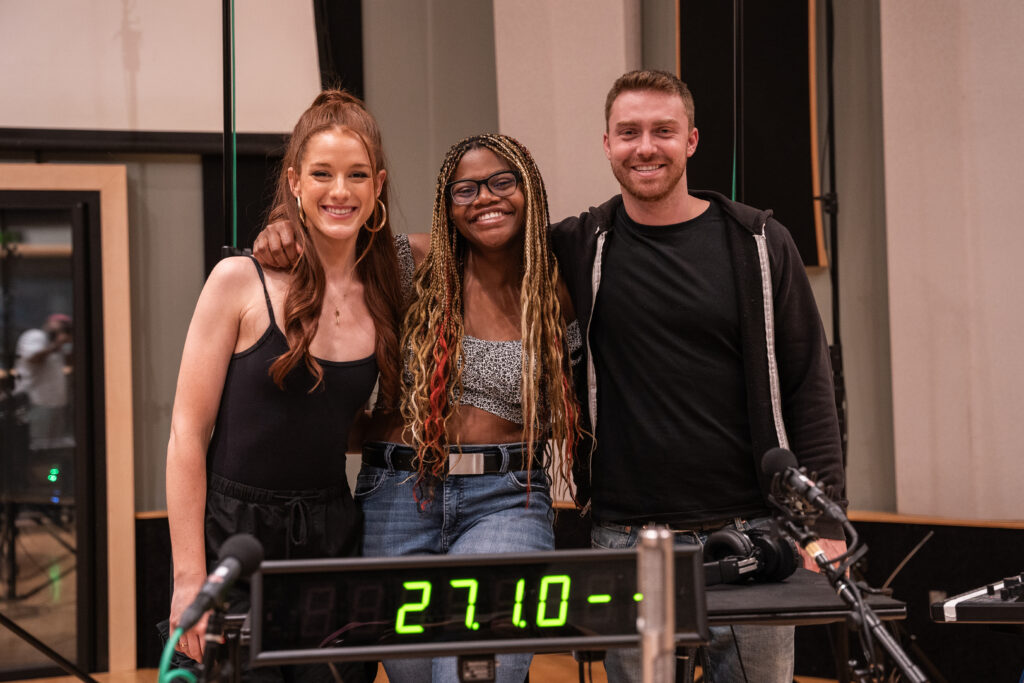
A native of Atlanta, Ga., Collier was a Popular Music Performance major with an emphasis in Songwriting and a minor in Music Industry; and Los Angeles native Vendig was a Music Industry major with a Recording Engineering minor. They first connected a year and a half ago when assistant professor of practice in Music Technology Smith, their mutual mentor as Thornton students and now colleague, contacted them with an opportunity to work on a project for Sony.
They finished that project (the “Second Arrow” EP dropped Oct. 13) and started on another because, Collier noted, “our musical symbiosis was killing it,” when they got the call from Holt about the Coliseum song.
“Anytime Sean calls, we hop right on the phone because he’s always coming with a great opportunity, and we are so thankful for him calling us,” Collier said.
The Coliseum wanted to have the whole project wrapped in about three months. Vendig said that kind of fast turnaround is the nature of the beast.
“It’s a part of the job to be on your toes,” he said. “So, when Sean called us, we were like OK, we need to make this work.”
“Yeah, he called on a Friday,” Collier added, “and we started working on this and kind of finished it in the same breath on Wednesday. We cracked open 12-ounce Red Bulls earlier in the day, and we went for it!”
“A lot of my work has been in sync, so writing songs for TV and film, and they are brief oriented,” Vendig said. “So, it’s been super helpful in preparing for things, like responding to what someone else was looking for, and then also understanding how much artistry I bring to the table, and this was definitely more artists-heavy than normal.”
Collier said the real-world experience she got in Holt’s classes prepared her well.“I literally champion around USC Thornton, and I’m like, ‘If you want to know anything about the music industry, you gotta go there,’” she said. “Most of my junior and senior year, I was creating music for briefs and giving one sheets and presenting it and workshopping it with my professors and with my collaborators. It put me 10 to 15 steps ahead of people [entering] the industry. When I graduated, I felt like I knew exactly what I was doing.”
Victorious Energy
Collier and Vendig read the brief, researched the history of the Coliseum and were inspired. The duo spent hours around the clock writing the music and fine-tuning the lyrics, with language that speaks directly to the Coliseum and USC, but also creates poetry that feels remarkably universal.
The “fire,” and more specifically the “torch,” literally reference the Olympics and the USC emblem, while alluding to more abstract ideas of energy, enthusiasm and intensity, and even the Coliseum “passing the torch” to the next generation. “Victory” and “fight on” are not just part of USC culture, or only about sports, but also call to mind civic pride, the WWI vets the Coliseum was dedicated to, events in honor of the American military after WWII and the historic social justice leaders who spoke there.
“I would say the song is an empathetic fire starter to get people riled up about the legacy and the future of the Coliseum,” Vendig said. “I think the energy is victorious and, even though we don’t explicitly say it, it’s about unifying people and bringing people together in these huge moments where so many people get to share in this experience of being there and being entertained. So, I think that’s what the chorus highlights, that togetherness. The verse is the past. And then the second verse is the future.”
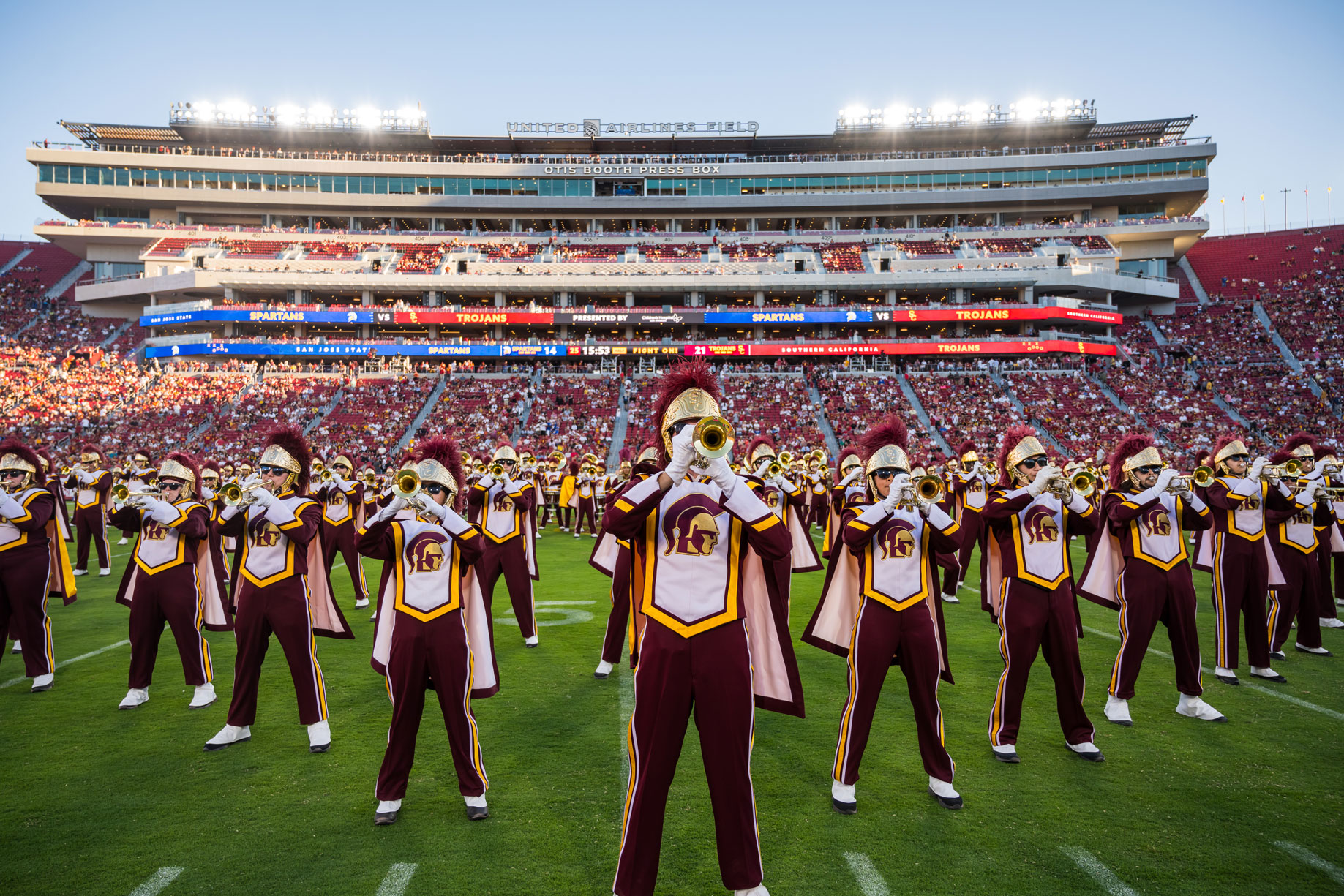
“That’s my dream about music in general, to bring people together and bring a sort of light that I don’t think is found very often,” Collier added.
Holt said about “We Came to Bring the Fire”: “I think it’s really right now. I love the energy. I love the cadence. It’s pretty fresh, it’s got some EDM pop influences. I think Sam and Ella’s voices are really strong; I love the duet aspect of the song. I think they hit the target on the head as it speaks to the lineage and the history of the place and also talks about what it means to move forward.”
As creative director, Holt helped the Coliseum develop the creative brief, gave the production teams suggestions for minor revisions, and guided the Coliseum team through technical questions, such as how a particular song might be produced or which songs would lend themselves better to a choir. But thankfully, he wasn’t part of the final decision because, he said, it would have been like trying to choose a favorite child.
“I’m super proud of all of these teams, our investment in their work and their growth. And I feel like any one of those songs would have served the Coliseum.”
A ‘Team Win’ for the Trojan Family
Meanwhile, the song that Collier and Vendig hope will unify people has already brought the Trojan Family together. On Sunday, Oct. 15, Holt led a recording session of the song at Evergreen Studios that included a choir of Thornton singers arranged by alumna Tehillah Alphonso ’20, student musicians, and a production team of Thornton faculty. There was a collective spirit around the project.
“Anything that happens with our students, whether they’re on campus or out there in the world winning, is a team win for us,” Holt said. “Our faculty in the Music Production program, the Songwriting program, are all instrumental in making sure our students are ready.”
“I feel like this is a family affair,” Collier said, “and that none of us are doing this alone.”
“I tell everyone that I think USC changed my life,” she added. “Before I came to USC, I was alone trying to make my artistic career happen. When I first got to campus and saw all the people my age playing instruments and producing, I felt like a part of my soul actually opened up. USC gave me the community of collaborators, friends and mentors to get the skill set and competence I needed to be able to show up in this industry confidently.”
Even though she graduated recently, Collier expressed effusive appreciation for how much she has already achieved and looks forward to giving back to the program and Thornton.
“I want to go back one day and mentor there because my mentors, Smidi and Sean, have changed my life. And the students that I got to interact with, we’re still collaborators and friends. A lot of my career and job opportunities have come from being a USC alum, and Sam and I wouldn’t have met if it wasn’t for USC.”
Vendig agreed it was hard to imagine what his life and career would have been like without USC.
“The relationships I formed, the skills I learned, working with incredible educators like Smidi and Sean — USC was a huge opportunity, and I was humbled by the experience. It’s not the technical skills that are invaluable about the program; that I could learn potentially anywhere. It’s the philosophy behind what we do in music. It’s the emotional navigation that we need to bring to the table in dealing with this industry. That’s stuff you can’t find anywhere else.”
